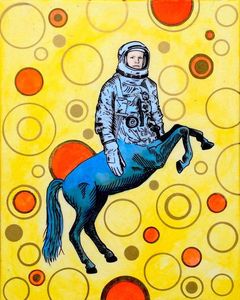Paul Vermeersch & The Holy Order
I don’t need a special space to write. I don’t need candles, or a window to look out onto a body of water or a forest. There’s nothing interesting on my desk, no amethysts. I believe that in the age of laptops we’re lucky as writers that we can write anywhere so: coffee shops. The world is my latte (I can’t afford oysters and all that slime would get in between keys).
In the past, I had an opportunity to write by the Ocean and once by a lake (heavenly, indulgent experiences) but the last column for Open Book I wrote in a mani-pedi chair while getting “Apple Red” painted on my toes. My environment has no bearing on what I end up producing. I believe it’s good to train yourself to be able to work anywhere because if you’re bogged down by the perfection of your surroundings as being the necessity to produce writing, you limit yourself. But don’t take it from me. Here’s this from the recent profile of Margaret Atwood in The New Yorker:
“Atwood does not require a particular desk, arranged in a particular way, before she can work. ‘There’s a good and a bad side to that,’ she told me. ‘If I did have those things, then I would be able to put myself in that fetishistic situation, and the writing would flow into me, because of the magical objects. But I don’t have those, so that doesn’t happen.’ The good side is that she can write anywhere, and does so, prolifically (…)On one occasion, over tea, she showed me her left hand: it had writing on it. ‘When all else fails, you do have a surface you can write on,’ she said.”
***
Today, I’d like to introduce a multitalented artist, Paul Vermeersch, who edited my novel GUY. He was a great editor and pushed me to get out of my comfort zone when it came to creating a multifaceted, unpleasant but also sympathetic narrator of the novel. But this is not about me—this is about Paul being the sort of editor who instinctively knows what his author really wants to say and he’s able to get that out of her. Besides being an excellent editor and producing interesting, original artwork, Paul is also an author, and a creative-writing teacher.
How did you get into visual art?
I studied visual arts for two years as an undergraduate before switching to an English degree. Eventually I gave up painting so I could concentrate on writing, believing I could only pursue one art form in a meaningful way, and perhaps I was right at the time. I eventually came back to making visual art as way to clear my head. Between writing and teaching and editing, I spend so much of time waking and working life with the nuts and bolts of language, I find it relaxing to think in images. I’ve never made a living from my visual art, but it’s nice to sell a drawing or painting now and again.
What inspires your art? (And please, tell us about The Holy Order of the Sasquatch!)
Your CanLit News
Subscribe to Open Book’s newsletter to get local book events, literary content, writing tips, and more in your inbox
I find myself inspired by the optimism inherent in the Space Age and the Atomic Age, the idea that humanity can accomplish anything: walk on the Moon, travel to the stars, build anything we can imagine. That comes hand-in-hand with the fact that our present time was that time's future, and it hasn’t measured up to the optimism of the era. The fantastic future of the past always becomes the banal present. They imagined a utopia, and what we have now is dystopian by comparison. That is also a part of the imagery of my work. It’s a dynamic that plays a significant role in an on-going project of mine called The Holy Order of the Sasquatch, a conceptual religion that uses Bigfoot, or Saint Bigfoot, as a symbol for the things we imagine but too frequently dismiss. In the Holy Order, imagination is the greatest virtue — the products of our daydreams, our figments, are to be cherished, and wild hypotheses are to be encouraged.
Your favourite artist?
Lately, I’m quite taken with the lowbrow and pop surrealist movements: KRK Ryden, Mark Ryden, Mark Mothersbaugh, Marion Peck, etc.
The views expressed in the Writer-in-Residence blogs are those held by the authors and do not necessarily reflect the views of Open Book.



